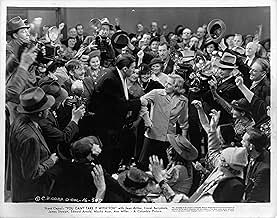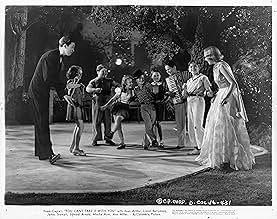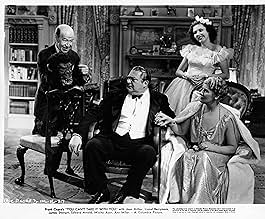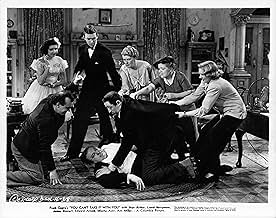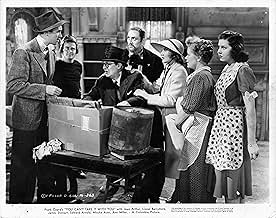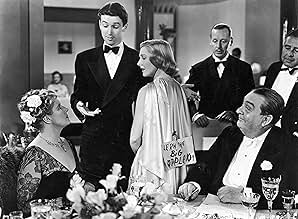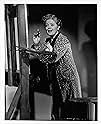AVALIAÇÃO DA IMDb
7,8/10
30 mil
SUA AVALIAÇÃO
Um homem de uma família rica se compromete com uma mulher de uma família atenciosa, mas decididamente excêntrica.Um homem de uma família rica se compromete com uma mulher de uma família atenciosa, mas decididamente excêntrica.Um homem de uma família rica se compromete com uma mulher de uma família atenciosa, mas decididamente excêntrica.
- Direção
- Roteiristas
- Artistas
- Ganhou 2 Oscars
- 6 vitórias e 7 indicações no total
Eddie 'Rochester' Anderson
- Donald
- (as Eddie Anderson)
- Direção
- Roteiristas
- Elenco e equipe completos
- Produção, bilheteria e muito mais no IMDbPro
Avaliações em destaque
You Can't Take it With You is a very funny and entertaining film. Bringing Up Baby is probably the only film that has ever made me laugh as hard as this one. James Stewart and Jean Arthur are magical together, just as they were in Mr. Smith Goes to Washington. This is yet another great film by Frank Capra and was rewarded with an Oscar for Best Picture in 1938.
Stewart comes from a rich and completely uptight family. Miss Arthur is the only relatively sane member of a very wild family. Lionel Barrymore is wonderful as the grandfather here. He is so warm and funny in this movie, it's hard to believe he's the same man who played the evil Mr. Potter in It's A Wonderful Life. Edward Arnold who was known for playing slimy villians, is great as Stewart's very wealthy and totally stuck-up father.
Stewart comes from a rich and completely uptight family. Miss Arthur is the only relatively sane member of a very wild family. Lionel Barrymore is wonderful as the grandfather here. He is so warm and funny in this movie, it's hard to believe he's the same man who played the evil Mr. Potter in It's A Wonderful Life. Edward Arnold who was known for playing slimy villians, is great as Stewart's very wealthy and totally stuck-up father.
You Can't Take It With You won for Best Picture of 1938 and got Frank Capra his third Oscar for Best Director. Looking at it now it is firmly anchored in the decade that spawned it and the Oscar is a tribute to authors Kaufman and Hart and their popularity in that time. You Can't Take It With You came off a Broadway run of 838 performances for the 1936-1938 Broadway seasons.
It's a tale of two men and their families. Edward Arnold plays Anthony Kirby millionaire banker and industrialist who is obsessed with both making money and his social position, though the latter is more in deference to his snooty wife Mary Forbes. Their son James Stewart is preparing uneasily to step into his father's world. What really is Stewart's main interest is the romance he's got going with the only normal member of that other family, Jean Arthur.
Her grandfather is the second man with a family. A very extended family that all lives under one roof because that's how Lionel Barrymore as Grandpa Vanderhof likes it. He's got a daughter who writes unpublished plays, a son-in-law who likes to experiment with fireworks, a granddaughter who aspires to be a ballerina, her husband who is a xylophone virtuoso and an iceman who was so taken with the house he just quit his job and stayed there. I can't really blame Halliwell Hobbes the iceman. If I was being supported by Jean Arthur's salary as a secretary and Lionel Barrymore's investments, I'd quit working myself.
In fact I can understand Barrymore's sentiments. I had an opportunity to retire early myself and took it and don't regret it. Of course I'm not supporting a whole extended family either. Let Sanuel S. Hinds, Spring Byington, Ann Miller, and Dub Taylor go out and earn a little and then become bohemians.
Both Arnold and Barrymore are extreme in their philosophy and the play and film are weighed heavily in Barrymore's balance. But looking at it objectively, Barrymore has a more realistic outlook for most people. There are a couple of dinner scenes at the Vanderhof house and it looks like quite a feed. Who's paying for it?
This was James Stewart's first and Jean Arthur's second film with Frank Capra. Next year they would do their second and last in the much acclaimed Mr. Smith Goes to Washington.
In doing the screen adaptation, Capra and screenwriter Robert Riskin created a whole new character in Mr. Poppins played by Donald Meek. Poppins is an inoffensive little bureaucrat who would rather make little toys than add columns of figures all day. One meeting with Lionel Barrymore persuades Donald Meek to follow his dream. He blended so well into the Vanderhof household that Kaufman and Hart praised his creation.
Though You Can't Take It With You is dated it is still funny as all get out. And you haven't lived until you've heard Brahm's Hungarian Dance Number 5 done as a xylophone solo.
It's a tale of two men and their families. Edward Arnold plays Anthony Kirby millionaire banker and industrialist who is obsessed with both making money and his social position, though the latter is more in deference to his snooty wife Mary Forbes. Their son James Stewart is preparing uneasily to step into his father's world. What really is Stewart's main interest is the romance he's got going with the only normal member of that other family, Jean Arthur.
Her grandfather is the second man with a family. A very extended family that all lives under one roof because that's how Lionel Barrymore as Grandpa Vanderhof likes it. He's got a daughter who writes unpublished plays, a son-in-law who likes to experiment with fireworks, a granddaughter who aspires to be a ballerina, her husband who is a xylophone virtuoso and an iceman who was so taken with the house he just quit his job and stayed there. I can't really blame Halliwell Hobbes the iceman. If I was being supported by Jean Arthur's salary as a secretary and Lionel Barrymore's investments, I'd quit working myself.
In fact I can understand Barrymore's sentiments. I had an opportunity to retire early myself and took it and don't regret it. Of course I'm not supporting a whole extended family either. Let Sanuel S. Hinds, Spring Byington, Ann Miller, and Dub Taylor go out and earn a little and then become bohemians.
Both Arnold and Barrymore are extreme in their philosophy and the play and film are weighed heavily in Barrymore's balance. But looking at it objectively, Barrymore has a more realistic outlook for most people. There are a couple of dinner scenes at the Vanderhof house and it looks like quite a feed. Who's paying for it?
This was James Stewart's first and Jean Arthur's second film with Frank Capra. Next year they would do their second and last in the much acclaimed Mr. Smith Goes to Washington.
In doing the screen adaptation, Capra and screenwriter Robert Riskin created a whole new character in Mr. Poppins played by Donald Meek. Poppins is an inoffensive little bureaucrat who would rather make little toys than add columns of figures all day. One meeting with Lionel Barrymore persuades Donald Meek to follow his dream. He blended so well into the Vanderhof household that Kaufman and Hart praised his creation.
Though You Can't Take It With You is dated it is still funny as all get out. And you haven't lived until you've heard Brahm's Hungarian Dance Number 5 done as a xylophone solo.
Take a large free-spirited family without visible means of support. Add a large mean-spirited tycoon intent on taking over their neighborhood. Mix in a romance between their daughter & his son. Sprinkle with zaniness & bake for two hours. Enjoy while hot.
This is one of those big comedy productions with a huge cast that only someone like Frank Capra could have pulled off. That he did so, winning the 1938 Best Picture Oscar, is immensely to his credit.
Hobbling on the crutches that signaled the crippling arthritis that would soon confine him to a wheelchair, Lionel Barrymore is the focal point of the film as the grandfather of a wacky clan that believes in doing whatever makes them happy. So they dance, make fireworks, bake candy, paint, write novels, and construct toys with equal joy - laughing through the Depression with much love & great contentment. Jean Arthur, James Stewart & Edward Arnold co-star, with a mammoth cast of supporting players.
This is the movie for viewers who want to feel warm & safe & cuddled & protected.
This is one of those big comedy productions with a huge cast that only someone like Frank Capra could have pulled off. That he did so, winning the 1938 Best Picture Oscar, is immensely to his credit.
Hobbling on the crutches that signaled the crippling arthritis that would soon confine him to a wheelchair, Lionel Barrymore is the focal point of the film as the grandfather of a wacky clan that believes in doing whatever makes them happy. So they dance, make fireworks, bake candy, paint, write novels, and construct toys with equal joy - laughing through the Depression with much love & great contentment. Jean Arthur, James Stewart & Edward Arnold co-star, with a mammoth cast of supporting players.
This is the movie for viewers who want to feel warm & safe & cuddled & protected.
10gaityr
I wouldn't exactly call YOU CAN'T TAKE IT WITH YOU (YCTIWY) Capra's forgotten movie--after all, it *did* win the Best Picture Oscar in its year. And I *have* heard of this film by word of mouth previously, though perhaps not as frequently or with as much ubiquity as some of Capra's other films. Compared to IT'S A WONDERFUL LIFE and MR. SMITH GOES TO WASHINGTON, for example, YCTIWY distinctly has the status of a 'minor classic'. I don't believe this is deserved, even if themes and (co-)stars are shared between these movies: YCTIWY should definitely be far better known and remembered than it actually is.
First of all, the story-telling is flawless. It very cleverly sets up the two very different families, the Vanderhof/Sycamores (an offbeat family trading most importantly in happiness) and the Kirbys (a stiff up tight banking family trading mostly in weapons). To complete the biggest deal of his career, Anthony Kirby Sr (Edward Arnold) must buy up the last house in a neighbourhood, and of course, this house belongs to Martin Vanderhof (a delightful Lionel Barrymore). The movie pleasantly surprised me in *not* having young Tony Kirby (James Stewart) be assigned to get Vanderhof to sell his house and thereby falling in love with Alice Sycamore (Jean Arthur) and her zany family. Rather, he was in love with her to begin with, and loved her regardless of what he thought of her family. (Though it would be impossible to hate any of them, I feel!) The story really is simple: Tony loves Alice no matter what, and doesn't want her or her family to put on a show to impress his own family. When he surprises her by turning up a day early for a dinner engagement, the Kirbys meet the Vanderhof/Sycamores for who they truly are, wind up in jail, and along the way, learn a little bit about being real human beings.
There are several delightful scenes in the film as well, all beautifully filmed and connected such that the story is a coherent whole. I'm especially partial to practically any scene with James Stewart wooing Jean Arthur (those two, quite seriously, make the cutest couple imaginable)--I love it when he sort of proposes to her. "Scratch hard enough and you'll find a proposal." Or that lovely intimate scene in the park where he directs her to a seat like he would at the ballet, or when they start dancing with the neighbourhood children. The scene in the restaurant was also amusing, when Tony kept warning Alice that there was a scream on the way, building it up so perfectly that *she* wound up screaming before he did. It's hard to beat the scene in night court too, when Capra foreshadows pretty much the exact same scene and sentiment in the forthcoming IT'S A WONDERFUL LIFE, when all of Vanderhof's friends chip in to pay off his fine. It's sweet, it's real, and it's something you really do wish could still happen in this world. Even the littlest things like Grandpa Vanderhof's dinnertime prayers are enough to remind the viewer of what a world could be like if we kept our values simple, our wants satisfied, and ourselves happy.
Second of all, the acting is superlative. How could it *not* be, with a cast like this? Evidently I was completely charmed by James Stewart and Jean Arthur, who are both incredibly believable both as real people and movie stars, and who together make Tony and Alice an utterly credible, true-to-life couple. Edward Arnold was great as the stuffed shirt Anthony Kirby Sr too--his eventual 'thawing' was something that could easily have been played in too exaggerated a fashion, but both the actor and director, I suspect, are too good to have allowed that to happen. I also had great fun watching Ann Miller in her secondary role as Essie Sycamore, Alice's dancing sister. I sincerely hope that every person making this film had just as much fun as I did watching it, because the whole secondary cast was excellent, and I loved all the characters we were introduced to, particularly the entire Sycamore family with their attendant friends (the ex-iceman DePinna, or the toymaker Poppins) and even their servants Rheba and Donald, who were treated almost as much as part of the family as could be expected at that time. But my greatest praise would have to be reserved for Lionel Barrymore as Martin Vanderhof--a sweeter, lovelier old man you just couldn't imagine, and a complete change from his much-better-known Mr. Potter in IT'S A WONDERFUL LIFE. He really does make Grandpa Vanderhof very much a real person, from his reminiscences about Grandma Vanderhof, to his messing around with the IRS agent, to his harmonica-playing and evident love of life and people.
I really could not say enough good things about this movie (which I prefer to IT'S A WONDERFUL LIFE). It'll make you laugh, it'll make you cry, and quite frankly, it'll make you glad to be alive. Not many movies can do that. And it's most certainly true that you can't take your money with you... but what you *can* do is take this movie and its message to heart. 10/10, without a doubt.
First of all, the story-telling is flawless. It very cleverly sets up the two very different families, the Vanderhof/Sycamores (an offbeat family trading most importantly in happiness) and the Kirbys (a stiff up tight banking family trading mostly in weapons). To complete the biggest deal of his career, Anthony Kirby Sr (Edward Arnold) must buy up the last house in a neighbourhood, and of course, this house belongs to Martin Vanderhof (a delightful Lionel Barrymore). The movie pleasantly surprised me in *not* having young Tony Kirby (James Stewart) be assigned to get Vanderhof to sell his house and thereby falling in love with Alice Sycamore (Jean Arthur) and her zany family. Rather, he was in love with her to begin with, and loved her regardless of what he thought of her family. (Though it would be impossible to hate any of them, I feel!) The story really is simple: Tony loves Alice no matter what, and doesn't want her or her family to put on a show to impress his own family. When he surprises her by turning up a day early for a dinner engagement, the Kirbys meet the Vanderhof/Sycamores for who they truly are, wind up in jail, and along the way, learn a little bit about being real human beings.
There are several delightful scenes in the film as well, all beautifully filmed and connected such that the story is a coherent whole. I'm especially partial to practically any scene with James Stewart wooing Jean Arthur (those two, quite seriously, make the cutest couple imaginable)--I love it when he sort of proposes to her. "Scratch hard enough and you'll find a proposal." Or that lovely intimate scene in the park where he directs her to a seat like he would at the ballet, or when they start dancing with the neighbourhood children. The scene in the restaurant was also amusing, when Tony kept warning Alice that there was a scream on the way, building it up so perfectly that *she* wound up screaming before he did. It's hard to beat the scene in night court too, when Capra foreshadows pretty much the exact same scene and sentiment in the forthcoming IT'S A WONDERFUL LIFE, when all of Vanderhof's friends chip in to pay off his fine. It's sweet, it's real, and it's something you really do wish could still happen in this world. Even the littlest things like Grandpa Vanderhof's dinnertime prayers are enough to remind the viewer of what a world could be like if we kept our values simple, our wants satisfied, and ourselves happy.
Second of all, the acting is superlative. How could it *not* be, with a cast like this? Evidently I was completely charmed by James Stewart and Jean Arthur, who are both incredibly believable both as real people and movie stars, and who together make Tony and Alice an utterly credible, true-to-life couple. Edward Arnold was great as the stuffed shirt Anthony Kirby Sr too--his eventual 'thawing' was something that could easily have been played in too exaggerated a fashion, but both the actor and director, I suspect, are too good to have allowed that to happen. I also had great fun watching Ann Miller in her secondary role as Essie Sycamore, Alice's dancing sister. I sincerely hope that every person making this film had just as much fun as I did watching it, because the whole secondary cast was excellent, and I loved all the characters we were introduced to, particularly the entire Sycamore family with their attendant friends (the ex-iceman DePinna, or the toymaker Poppins) and even their servants Rheba and Donald, who were treated almost as much as part of the family as could be expected at that time. But my greatest praise would have to be reserved for Lionel Barrymore as Martin Vanderhof--a sweeter, lovelier old man you just couldn't imagine, and a complete change from his much-better-known Mr. Potter in IT'S A WONDERFUL LIFE. He really does make Grandpa Vanderhof very much a real person, from his reminiscences about Grandma Vanderhof, to his messing around with the IRS agent, to his harmonica-playing and evident love of life and people.
I really could not say enough good things about this movie (which I prefer to IT'S A WONDERFUL LIFE). It'll make you laugh, it'll make you cry, and quite frankly, it'll make you glad to be alive. Not many movies can do that. And it's most certainly true that you can't take your money with you... but what you *can* do is take this movie and its message to heart. 10/10, without a doubt.
10mjpooch
For film-goers and movie fans that are from my generation, it is easy for these films to get lost in the shuffle. Ask someone my age, who would now be 25, what the best movie of all time is, they're likely to say Pulp Fiction or Fight Club.
Not to take away from today's movies, but for anyone who has not gone back and viewed classic Capra, such as "You Can't Take it With You," then they are truly missing out.
This movie is pure magic and beauty. Lionel Barrymore gives a performance as relevant in 2005 as it was in 1938. And what can you say about Jimmy Stewart?? This is a rare gem of a film and in true Capra fashion, the climactic final scene brings tear to the eye, much the same way as Harry Bailey's toast in "It's a Wonderful Life."
Not to take away from today's movies, but for anyone who has not gone back and viewed classic Capra, such as "You Can't Take it With You," then they are truly missing out.
This movie is pure magic and beauty. Lionel Barrymore gives a performance as relevant in 2005 as it was in 1938. And what can you say about Jimmy Stewart?? This is a rare gem of a film and in true Capra fashion, the climactic final scene brings tear to the eye, much the same way as Harry Bailey's toast in "It's a Wonderful Life."
Oscars Best Picture Winners, Ranked
Oscars Best Picture Winners, Ranked
See the complete list of Oscars Best Picture winners, ranked by IMDb ratings.
Você sabia?
- CuriosidadesAnn Miller was only 15 years old when this movie was filmed. Her character is called on to perform numerous (amateur) ballet positions, including dancing en pointe. She had never been trained to do so, and wasn't using shoes with the proper support. She was just forcing her feet up onto their toes, which was very painful for her. She hid this from the cast and crew, but would cry (out of sight) off stage. James Stewart noticed her crying, though he didn't know why, and would have boxes of candy to make her feel better.
- Erros de gravaçãoWhen Alice is in the courtroom, she is wearing a trench coat as newspaper photographers take pictures. In the newspaper pictures, she is not wearing the coat.
- Citações
Grandpa Martin Vanderhof: Lincoln said, "With malice toward none, with charity to all." Nowadays they say, "Think the way I do or I'll bomb the daylights outta you."
- ConexõesEdited into Os Três Patetas com Hércules no Olimpo (1962)
- Trilhas sonorasValse Brilliante Op. 34 No 2
(1838) (uncredited)
Music by Frédéric Chopin
Played on an xylophone by Dub Taylor
Principais escolhas
Faça login para avaliar e ver a lista de recomendações personalizadas
- How long is You Can't Take It with You?Fornecido pela Alexa
Detalhes
- Data de lançamento
- País de origem
- Central de atendimento oficial
- Idiomas
- Também conhecido como
- Vive como quieras
- Locações de filme
- Empresa de produção
- Consulte mais créditos da empresa na IMDbPro
Bilheteria
- Orçamento
- US$ 1.644.736 (estimativa)
- Tempo de duração
- 2 h 6 min(126 min)
- Cor
- Proporção
- 1.37 : 1
Contribua para esta página
Sugerir uma alteração ou adicionar conteúdo ausente


